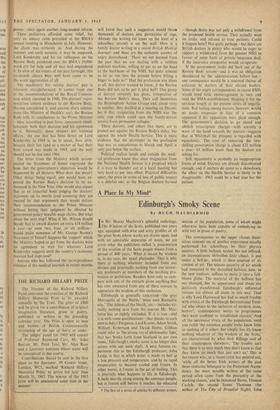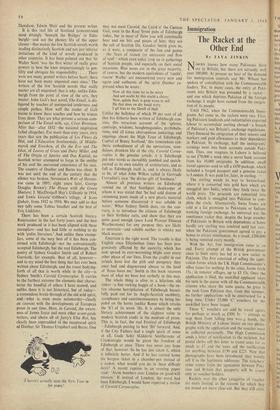A Place In My Mind*
Edinburgh's Smoky Scene
By HUGH MACDIARMID
IN Mr. Moray Maclaren's splendid anthology, The Wisdom of the Scots, published two years ago, equipped with wise and witty profiles of all the great Scots whose works are drawn upon, and with an admirable apparatus of notes, we are given what the publishers called 'a presentation of the wisdom of the Scots people drawn from a period of 800 years.' What is meant by wisdom is, in no case, the usual platitudes. That is why there is nothing whatever included from our divines and Practically nothing from our univer- sity professors or members of the teaching pro- fession or politicians. Readers have only to com- pare with any of the extracts given anything that has ever emanated from any of these sources to appreciate the wisdom of this exclusion.
Edinburgh as generally conceived—'the grey Metropolis of the North,' mine own Romantic city,"The Athens of the North,' etc.—includes vir- tually nothing save from the sources Mr. Mac- laren has so rightly excluded. If it is true--and it is with some qualifications—that thanks to such men as Adam Ferguson, Lord Kames. Adam Smith, William Robertson and David Hume, Gibbon could refer to 'the strong ray of philosophic light; that has 'broke forth from Scotland in our own times,' Edinburgh's smoky scene is no longer shot across with any such shaft. A very famous ex- periment due to the Edinburgh professor, John Leslie, is that in which water is made to boil At a low pressure and temperature, and by its rapid evaporation to become cooled and frozen. In other words. it freezes in the act of boiling. This. is precisely what happens to life in Edinburgh. It boils merrily along among the common people, but is frozen stiff before it reaches the educated 'The first of a series of articles by different writers. section of the population, some of whom might otherwise have been capable of embodying its wild reel in prose or poetry.
The consequence to the upper classes them- selves reminds me of another experiment usually performed for schoolboys by their physics masters. A little balloon, sealed, but not inflated, an inconspicuous shrivelled. little object, is put- under a bell-jar, which is then emptied of its content of air. The minute quantity of air which had remained in the shrivelled balloon, now, in the new medium, suffices to make it into a full- blown globe. The material of the balloon has not changed, but its appearance and shape are decisively transformed. Edinburgh's influential citizens are almost all made in this way. That is why Lord Harewood has had so much trouble with critics of the Edinburgh International Festi- val who object to the inclusion of modern, even, horror!, contemporary works in programmes they want confined to 'established classics.' And all the successive strata of the population, until you redch 'the common people' (who know little or nothing of it either, but simply live it), know nothing whatever of 'the wisdom of the Scots,' are characterised by what Josh Billings said of their counterparts elsewhere, 'The trouble isn't that there is so very much they don't know as that they know so much that just ain't so.' This is the reason why, as a recent critic has pointed out, 'while all the better Irish writers of the past three centuries belonged to the Protestant Ascen- dancy, the most notable writers of the same period often came from the peasantry or the working classes,' and he instanced Burns, Thomas Carlyle, the second James Thomson (the author of The City of Dreadful Night), Jolla
Davidson, Edwin Muir and the present writer.
It is this real life of Scotland (concentrated most strongly 'beneath the Bridges' in Edin- burgh)—and not the phoney life of the upper classes—that makes the few Scottish novels worth reading distinctively Scottish and not just inferior imitations of the kind of novels produced in other countries. It has been pointed out that Sir Walter Scott 'was the first writer of really great powers to bow the knee unquestioningly to gen- tility and abrogate his responsibility. . . . There were not many genteel writers before Scott; there have not been many ungenteel ones since.' The writers of the few Scottish novels that really matter are all ungenteel; that is why, unlike Edin- burgh from the point of view of the arts, they matter. John Galt's best novel, The Entail, is dis- figured by touches of unexpected tenderness and simple pathos. How well the reader of Galt learns to know these touches and how he winces from them. They are what prevent a serious com- parison of The Entail with, say, Cesar Birotteau. After that—after 1832—the national inspiration failed altogether. For more than sixty years, sixty years that saw the publication of Les Fleurs du Mal, and L'Education Sentimentale, of Middle- march and Erewhon, of On the Eve and The Idiot, of Leaves of Grass and Daisy Miller, and of The Origin of Species and Das Kapital, no Scottish writer attempted to forge in the smithy of his soul the uncreated conscience of his race. The country of Dunbar and Burns was silent. It was not until the end of the century that the silence was broken. Stevenson's Weir of Hermis- ton came in 1893; eight years later, George Douglas Brown's The House with the Green Shutters; J. MacDougall Hay's Gillespie in 1914, and Lewis Grassic Gibbon's trilogy, A Scots Quhair, from 1932 to 1934. We may add to that tiny tally some Tobias Smollett and the best of Eric Linklater.
There has been a certain Scottish literary Renaissance in the last forty years and the best work produced in it has been aligned with these exemplars—and has had little or nothing to do with 'polite literature.' And unlike these exemp- lars, some of the very best of it has been con- cerned with Edinburgh—not the conventionally accepted Edinburgh, but the real Edinburgh. The poetry of Sydney Goodsir Smith and of Robert Garrioch, for example. Best of all, however— and to my mind the best thing that has ever been written about Edinburgh, and the truest bodying- forth of all that is worth while in the city—is Sydney Smith's Carotid Cornucopias. It carries to the furthest extreme the elements that charac- terise the handful of others I have named, and unlike them it is not historical, but of today— a tremendous break-through of the old wild spirit, and—what is even more noteworthy—clearly au courant with the developments of European prose in our time. Here, in Carotid, the aware- ness of James Joyce and most other avant-garde writers, and above all of to Ubu Roi, has clearly been superadded to the recaptured spirit of Dunbar, Sir Thomas Urquhart and Burns. One '1 haven't actually seen the New Year in for years.' may not meet Carotid, the Caird o' the Cannon Gait, even' in the Rose Street pubs of Edinburgh today, but in most of them you will continually hear and see bits and pieces of him; they are the salt of Scottish life. Goodsir Smith gives us, as it were, a composite of the fun and games - -the 'feast of reason (or unreason) and flow
of soul'--which even today crop up in gatherings
of Scottish people, and especially on their social occasions. Blue noses are in the great majority, of course, but the modern equivalents of `rantin', • roarin' Wullie' are encountered every now and again and outbursts of the spirit Dunbar ex- pressed when he wrote:
Now all this tyme lat us be mirry And sett nocht by this warld a chirry;
Now, quhile thair is gude wyne to sell He that does on dry breid wirry
I gif him to the Devil! of Hell.
Unlike the ballyhoo of which 99 per cent of all that has hitherto been written of Edinburgh con- sists, this veracious account of the `splores, cantraips, wisdoms, houghmagandies, peribibula- tions, and all kinna abstrapulous junketings and ongoings abowt the High Toun of Edinburgh, Capital of Boney Scotland,' this tremendous syn- thetic embodiment of all the uproarious, scan- dalous, drunken life of the city, Carotid C0111U- copius is the genuine article; it is Edinburgh put into words as incredibly jumbled and spatch- cocked as its own totality of architecture, and as full as Edinburgh itself is, and is always likely to be, of what John Wilkes called in Gertrude Corradini's case 'the divine gift of lewdness.'
Almost all previous writers on Edinburgh remind me of that Southport shopkeeper of whom it was stated that 'he had sold dozens of swimming pants made of a new plastic material before someone discovered it was soluble in water.' What Sydney Smith does, on the con- trary, is to introduce the citizens of Edinburgh to their birthday suits, and show that they are quite good enough (pace Lord Provost Duncan Weatherstone) for any purpose they are likely to entertain—and soluble neither in whisky nor black master.
Entertain is the right word. The trouble is that English since Elizabethan times has been pro- gressively afflicted by the austerity which has now spread its ever-worsening blight over every other phase of our lives. Even the graffiti in our urinals have lost the pith and pungency they once had and degenerated almost to the level of 'Jesus loves me.' Smith in this book recovers most of what we have lost verbally in this way.
The whole thing is alive as a hilarious old tinker--a fine reeking haggis of a book—the en- tire obscene horripilation of Edinburgh beauti- fully paid out for its Anglo-Scottish snobbery, sycophancy and sanctimoniousness by being im- paled on the horns (unlike Rome which retains the 'h') of its seven 'ills. It is almost the only literary achievement of the slightest value to modern Sdottish credit in the medium of prose. This is, in fact, the real Festival of Edinburgh —Edinburgh putting its best 'fist' forward. And, if the City Fathers had a single spark of sense at all, Gude Schir Skidderie Smithereens of Crankmirglo would be given the freedom of Edinburgh at once. There was never any hope of that, however. So he has just taken it, which is infinitely better. And if he has carried home his burgess ticket in a chamber-pot instead of a casket, what would you do in these difficult days? A recent caption in an evening paper read : 'Atom bombers over London on good-will mission.' If instead of London, the word had been Edinburgh, I would have expected a review of Carotid Cornucopias.































 Previous page
Previous page